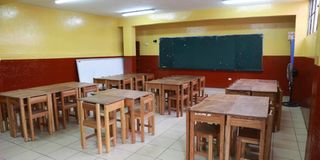Let’s start planning for school reopening now, experts

As the reopening of schools after their closure for two years due to Covid-19 nears, experts have called upon for immediate preparations if the reopening is to be meaningful in January next year.
As the reopening of schools after their closure for two years due to Covid-19 nears, experts have called upon for immediate preparations if the reopening is to be meaningful in January next year.
Mr Musa Mugoya, the Programmes Officer of Right to Education at Initiative for Social and Economic Rights, said there’s need to gain the momentum now on the reopening of schools so that we don’t wait for January and we start fidgeting around.
“Let’s get the momentum now and by the time we enter the New Year, we have hit the ground running. To a greater extent, the unpreparedness, will spill over to the greater part of next year which will contribute to time loss if we don’t prepare between now and December,” Mr Mugoya advised yesterday during a weekly Town Hall webinar discussion in Kampala.
The Webinar was themed: “Education and Covid-19, what is the way forward?”
Pastor Jackie Barlow, was also of the view that as churches, there is need to prepare learners and get their minds back to school mood after losing out on studies for two years.
“As churches, we need to strategically prepare children in this period for the reopening next year and give them purpose. Right now, they feel their dream has been lost after a long lock-down,” she said
“How do you motivate them that their dreams are not all lost? That calls for reinstatement of the need of reopening of churches where we can prepare them.” she added.
President Museveni while announcing the reopening of schools on September 22, said tertiary institutions will open on November 1 this year while other learning institutions will reopen in January next year.
This he said would reopen after 4.8 million people who fall under the vulnerable category, have been vaccinated.
However, recently, the President said the reopening of schools in January, will now be dependent on the vaccination of seven million people.
Mr Museveni ordered the closure of schools in March last year as one of the measures to curb on the spread of Covid-19.
Along the way, candidate classes were reopened to complete the syllabus and also sit for their final 2020 exams.
The phased reopening of the schools continued with semi candidate classes resuming though around mid this year, the same were closed after like one month following the surge in the infections in the second wave.
Speaking at the same webinar, Mr Abubaker Matanda, a magistrate and law lecturer at Islamic University in Uganda (IUIU), said during the lock-down, the improvised online teaching was not so effective as anticipated.
He explained that more than half of his students he used to teach physically before Covid-19 struck, were unable to log in and attend online lectures.
“I don’t remember at any moment, when we had more than half of that number of the students attending the online lessons. So the question I had at the back of my mind was always, were are the rest of the students?”
Adding: “IUIU being an Islamic based institution, there are certain rules to be played by for example, female students while on campus, are supposed to veil their heads but when it came to online classes, you find someone’s profile picture is not veiled or even dressed in a mini skirt. So the question was, do we throw them out of the online class.”
Ms Shannon Mujera, the team leader of National Christian Students’ Association of Kenya asked about what lessons Ugandans are learning from their neighbors as they prepare to fully reopen next year in January.
Kenya recently, as a way of reopening up the economy, removed night curfew restrictions, hence reopening the night economy.



